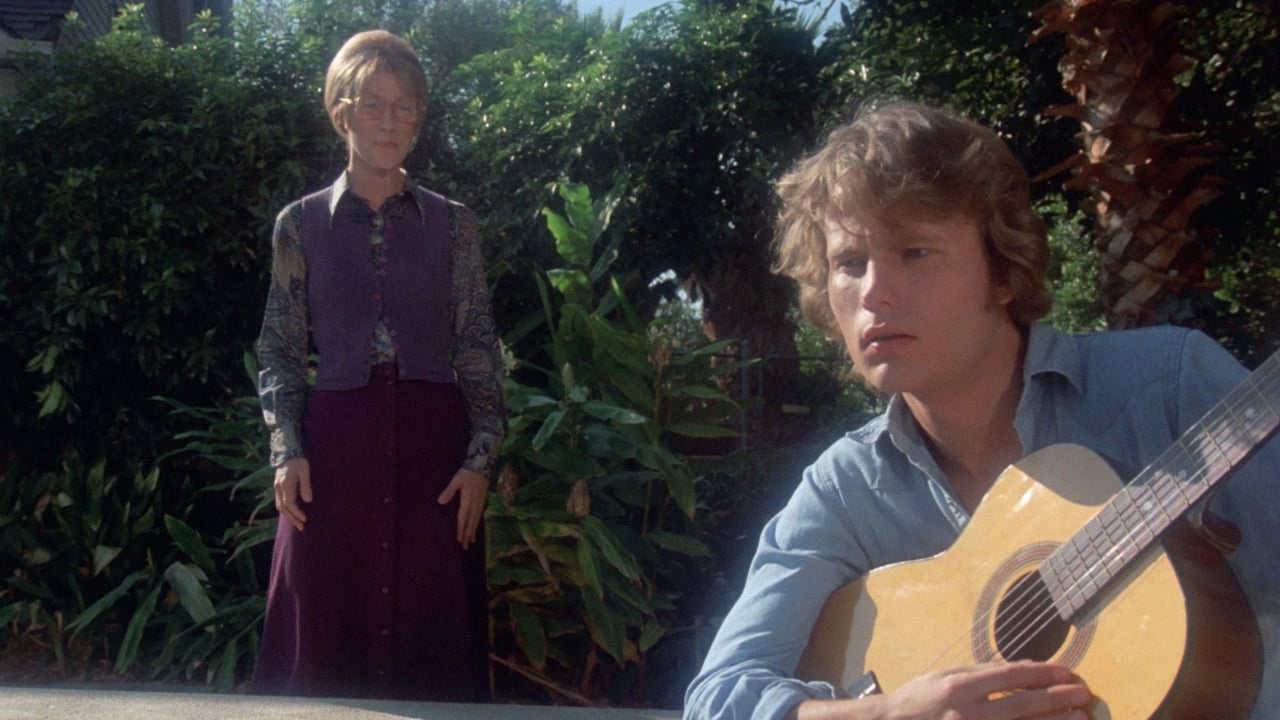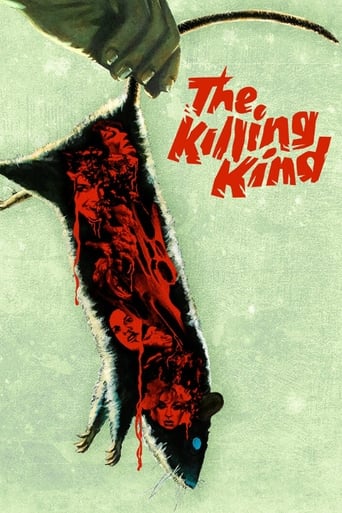Sexylocher
Masterful Movie
CrawlerChunky
In truth, there is barely enough story here to make a film.
Brendon Jones
It’s fine. It's literally the definition of a fine movie. You’ve seen it before, you know every beat and outcome before the characters even do. Only question is how much escapism you’re looking for.
Billie Morin
This movie feels like it was made purely to piss off people who want good shows
jarrodmcdonald-1
John Savage (an appropriate name for an actor playing a Norman Bates type character in a horror film) costars as Ann Sothern's son, and he's just come home from a two-year stint in prison. He had been caught up in a gang rape, depicted in the opening moments of the film, but was innocent at the time. Now that he's out and living with mama again, he wants revenge on the people who put him behind bars. He becomes a serial killer, and as the film progresses, we watch him deal with his homicidal rages. In an interview years later, director Curtis Harrington said that people praised the film for accurately showing what motivates a young man to be a compulsive murderer. I am not sure if a guy being kissed by his mother would exactly prompt him to go off on a bunch of killing sprees. Also, there are some scenes where he flirts with the idea of killing someone-- specifically, an incident in a swimming pool where he violently dunks Cindy Williams but does not drown her. If he had such impulses to kill, what would have stopped him? Why is he toying around with the idea of killing an innocent girl staying at his mother's place. If he was full of rage, wouldn't he just take care of business and get it over with the first time (he ends up killing her later in the movie). While I think the film definitely has some weak spots, the similarities between THE KILLING KIND and PSYCHO are obvious. In a way, this 1973 film plays out like a version of Norman Bates being released and coming back to the motel, where his mother is still alive after all. Can a guy like this ever be cured? Curtis Harrington suggests in this story that he cannot be cured, cannot be saved, and that eventually the mother must do away with him, in order to save the rest of society from the monster she's created. Perhaps we can look at the scene where his mother murders him to be a form of incestuous suicide (my phrase). Seems like heady stuff, doesn't it? The subtext that Harrington weaves throughout the story is that the young man was innocent of the incident that sent him to prison in the beginning, because he was impotent and couldn't get it on with the victim of the gang rape. So maybe when he's toying with Cindy Williams in the pool, he is toying with his own power over females. But how much of this is meant to be an indictment about his own sexuality, we cannot really tell. Instead, as the murderous impulses flare up, we are shown that he is now increasingly violent-- perhaps because when he was in prison, he learned to start liking things rough. Or is it because he's been smothered with so much mother love, like Norman and Mrs. Bates, that he is lashing out, like any good boy would...?
Woodyanders
Troubled and unstable Oedipal wreck sex offender Terry Lambert (an excellent and convincing performance by John Savage in an early lead role) gets released from prison after serving a two year sentence for gang rape he was forced to participate in and returns to the gloomy boarding house run by his doting and desperately lonely overbearing mother Thelma (superbly played with moving restraint and subtlety by Ann Southern). Terry develops an unhealthy fixation on comely, but naive aspiring model new boarder Lori Davis (a fine portrayal by Cindy Williams) and plots revenge on the folks responsible for sending him to jail. Director Curtis Harrington, working from a grimly compelling script by George Edwards and Tony Crechales, delivers an arrestingly stark, sad, and deeply creepy portrait of everyday madness, despair, denial, and the darker side of smothering motherhood that inevitably begets insanity and tragedy while doing his trademark expert job of creating and sustaining a bleak and seamy atmosphere that proves to be quite potent, intriguing, and ultimately heartbreaking as the depressing narrative unfolds towards a shattering bummer conclusion. Moreover, the uncomfortably incestuous and suffocating relationship between Terry and Thelma, a severely deviant and twisted sexuality, a few shocking moments of sudden brutal violence, and a dryly amusing sense of black humor further add to this picture's supremely unsettling edge. Savage and especially Southern do sterling work in their parts, with sturdy support from Luana Anders as snoopy and repressed librarian neighbor Louise, Ruth Roman as successful lawyer Rhea Benson, Sue Bernard as trampy rape victim Tina Moore, Marjorie Eaten as the doddery Mrs. Orland, and Peter Brocco as Louise's domineering crippled father. Mario Tosi's stylish cinematography makes neat occasional use of artful dissolves, slow motion, and freeze frames. Andrew Belling's haunting melancholy score does the moody trick. Highly recommended viewing for fans of Harrington's often offbeat and impressive work.
moonspinner55
Angry, deranged kid is paroled after serving two years in prison for taking part in a gang-rape; he returns home to his mother's boarding house in a cheaper section of Los Angeles but, with no plans (and no prodding from his gimme-a-little-kiss mommy), he goes after the women who did him wrong. Grimy, ineffectual Curtis Harrington-directed shocker, with a lame-duck screenplay credited to Tony Crechales and co-producer George Edwards. The plot cobbles together various ideas and scenes from a myriad of other thrillers (with a failed overlay of Hitchcock, besides), and the stray cruelty and general bad taste are often excruciating to wade through. Veteran actress Ann Sothern and the newcomers in the cast can possibly be forgiven, but what was Harrington's excuse? After jump-starting his career behind the camera with interesting curios, Harrington got stuck in a kind of post-"Baby Jane" rut, concentrating primarily on stories of delusional bottom-feeders operating on little money or brains; his sense of squalid atmospherics are far stronger than his talent in handling actors. A young John Savage is blobby and unformed in the leading role, while his character goes after female acquaintances without a provocative plan--he just seems restless and trapped by mama. Harrington must have known this script was a loser, injecting arty accouterments into the stew (slow-motion takes, flashback edits, and a really silly dream sequence). It doesn't work at all, and the movie failed to find the proper distribution after Universal passed. *1/2 from ****
Poseidon-3
Among the thousands of thriller/horror films swimming around out there, this one is virtually forgotten (though it is newly available- in a terrible print- on a low-priced DVD, paired with "The Sadist".) It's a shame because the cast is made up of a very remarkable collection of actors and the film has value as a psychological observation. Savage has just returned home after spending two years in jail for his (unwilling) part in a gang rape. His hilariously blowsy and slovenly mother (Sothern) dotes on him as if he's still 5 years-old. She has turned her large house into a boarding home, mostly comprised of old spinsters. This changes when she rents a room to a young aspiring model (Williams) who catches the eye of Savage. Before long, Savage's past as a pampered momma's boy and a sexually-frustrated teen comes to a head and he finds himself out of control. Much of this is noted by a repressed librarian (Anders) next door who is caring for her impossible, wheelchair-bound father. In time, women who have either hurt or let down Savage begin dying and eventually Sothern has to step in and take care of things. The plot is fairly simple, though there are some fascinating mental aspects to the characters. Savage is believable and intense. Sothern is wonderful. Her inimitable voice paired with her faded Dolly Partonesque hair and make up (and long lost figure!) combine to create a compelling screen persona. She and Savage share an unusual chemistry (reportedly affected by some one-upmanship on the set) that comes across well in the film. One scene in particular stands out as Sothern conveys to Savage the death of one of her tenants, all the while shaking raw bacon around in her shoddy kitchen! Though she is sloppy, mouthy and completely unconcerned about her diet, she still has those gorgeous eyes and a winning giggle that make her delightful to take in. This is quite a piece of work on Sothern's part. Roman has one extended scene as a financially successful lawyer who isn't as lucky as the outcome of her cases. Williams plays a foolish, but fairly likable character who stays in the house even after her underwear is vandalized. There are more than a few memorable moments in the film, not the least of which is an uproarious trip to the city dump while a rigor-mortified hand sticks out of a trash can! Though the production could hardly be called polished, it retains interest through the eclectic nature of the cast and the commitment to the material from the two leads.

